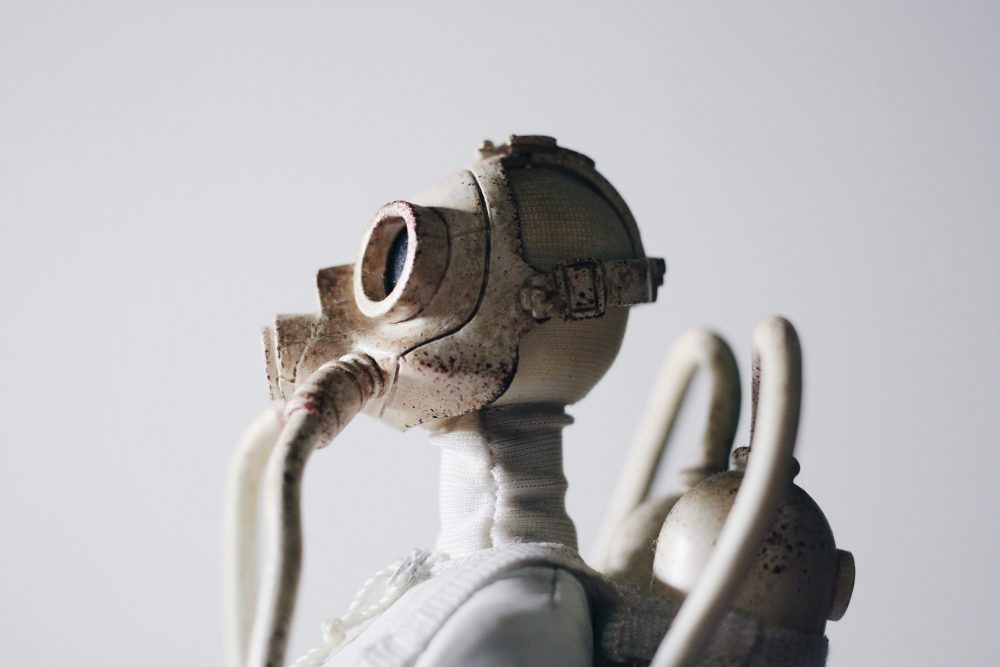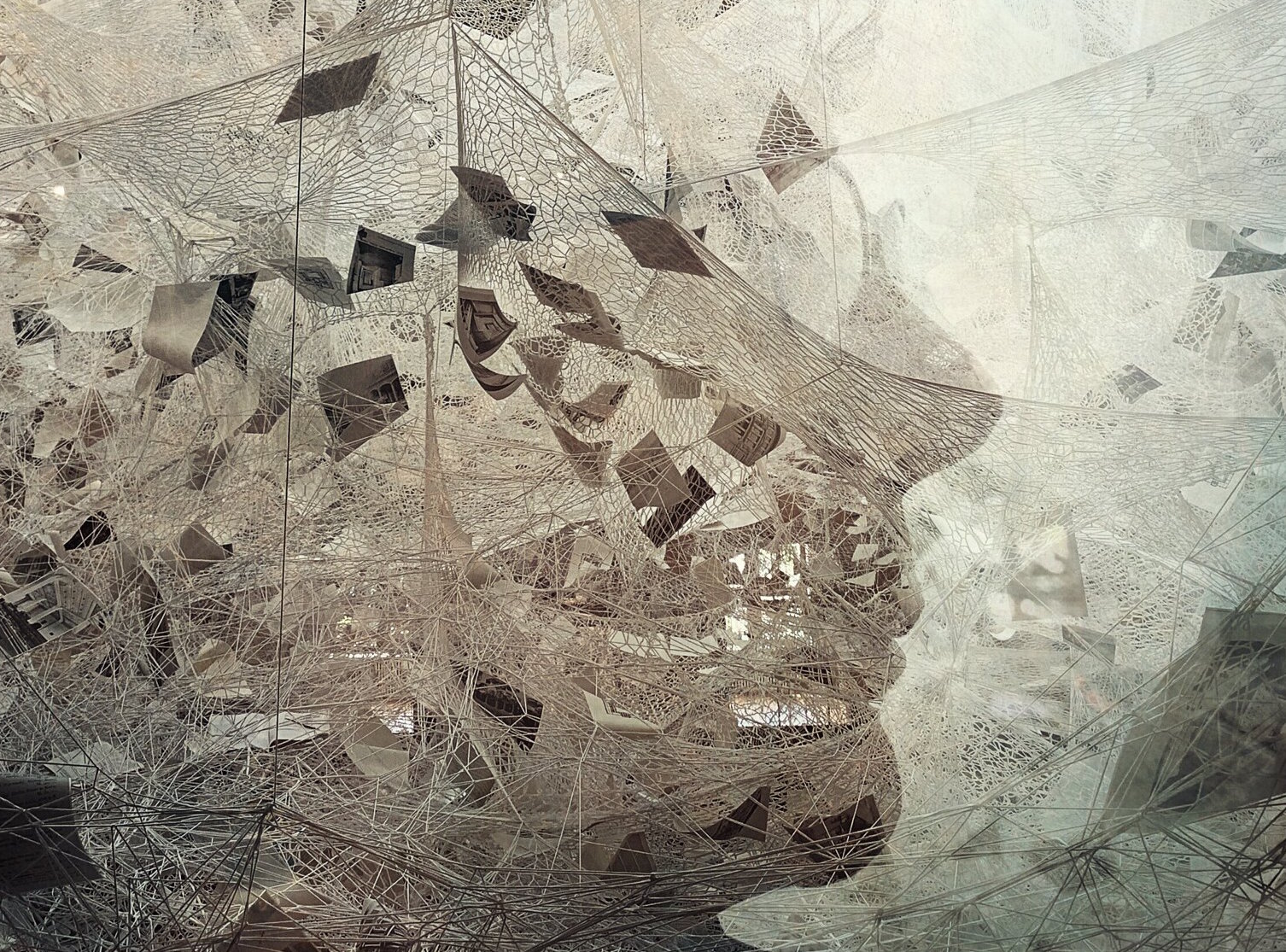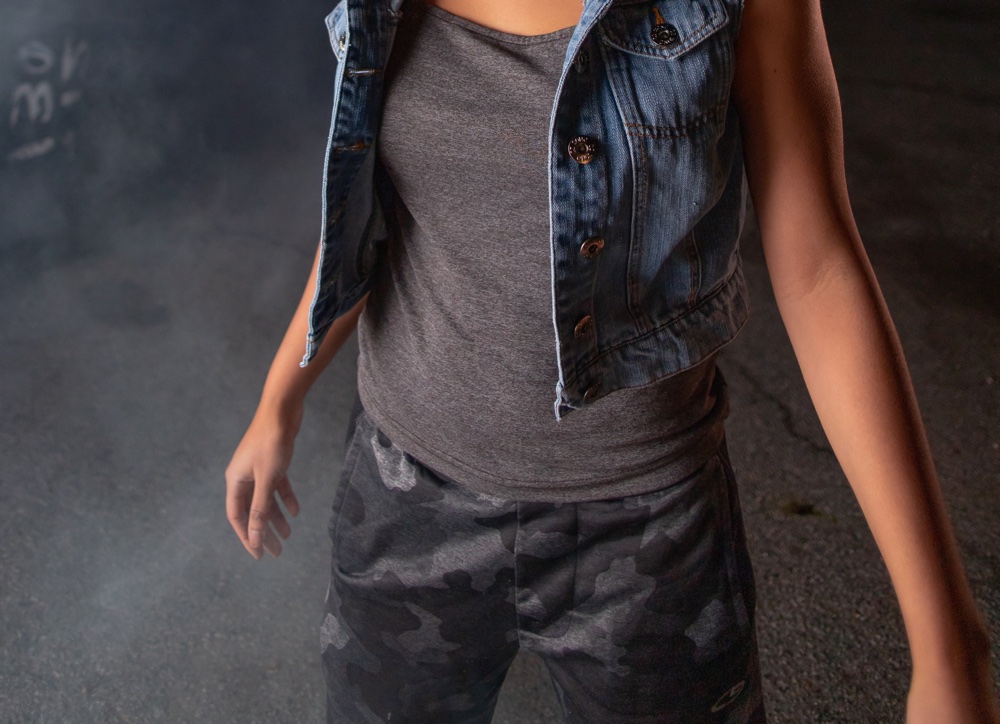interviews
Jeff VanderMeer & Cory Doctorow Discuss the Future of Sci-Fi & the World
Two modern masters talk biotech, climate change, activism & how sci-fi genre sensibilities have changed

Twenty-five years ago, Cory Doctorow and Jeff VanderMeer both attended the Clarion Writers Workshop, the premier science fiction and fantasy writing program. Since that time, VanderMeer and Doctorow have each gone on to long literary careers. By chance, their new novels, Borne (VanderMeer) and Walkaway (Doctorow) are being published on the same date this year, April 25th, which got them to talking, which got us to publishing their conversation.

Jeff VanderMeer: Fresh-faced and eager as we both might seem, I’m calling it: we’re pretty much grandpas now. (Literally, too.) Looking back over the past quarter century, it’s pretty clear that a lot has changed. And a lot of it for the good. The genre boundaries are much more fluid now. I’m one of those continual label-evaders so this suits me fine. I’d prefer to shape-shift, in part because my interests and curiosity vectors are always changing. One way I think we are definitely alike is in adapting well to the new environment, if in very different ways.
Cory Doctorow: We’re in the midst of a curious era for nerdy subculture, which is something I’ve been involved with since I started taking the subway to Saturday D&D clubs when I was 9 years old. Back then, it was *really hard* to find other people who found genre sensibilities satisfying. The covers of paperbacks on buses became a recognition semaphore (“I see you are reading a John Wyndham novel; I too, have read of the Triffids!”) Networked communications brought subcultures together — counterculture fashion identities like goth and punk; out-of-mainstream political identities from anarcho-syndicalism to intersectional feminism to (alas) neo-fascism.
VanderMeer: Coming into Clarion, you were a Heinlein enthusiast and I was an Angela Carter devotee, and we didn’t so much clash as — as I recall — have a few discussions about it. But I was definitely young and arrogant, so have to imagine I was annoyingly vehement. Sorry about that. I also know that I’ve taken great pleasure in watching your career take off — I feel like we’re both survivors over a pretty long span now, though we’ve taken different paths.
Doctorow: No apologies needed! If you’re not abrasive at some point at Clarion, you’re probably not trying hard enough. (I’m sure I was!)
VanderMeer: Oh, you were. But it was a group of total eccentrics and I think the whole nature of throwing 18 strangers together — especially a bunch of introverts and weirdos — and expecting harmony is kind of absurd. As for Heinlein, though, I still don’t like his work. Do you still read him? It’s curious how he’s become invisible to readers recently, especially given some of his libertarian leanings would seem to match the times.
Doctorow: Heinlein invented and refined a lot of the field’s signature moves, and moreover was at the epicenter of a lot of high weird craziness in his “real life” — he was a socialist Upton Sinclair doorbell-ringer; a Crowley-adjacent polyamorous pioneer whose alcoholic “white witch” story-doctor wife took up with the recently discharged ex-Navy-man L. Ron Hubbard; a vicious racist who was certain he wasn’t. Today, he’s a litmus test of sorts. You can learn a lot about a person by what they think Heinlein was all about. I personally love the way that contemporary SF is engaging with him — Charlie Stross ripping into the guts of Friday with Saturn’s Children; John Varley using the juvies like Red Planet to savage GWB’s war on terror; and now Ian McDonald’s Luna books, a frontal assault on Randism by way of The Moon is a Harsh Mistress. It’s deeply kinky, taking all this problematic stuff and just *owning* the way it bent the field, using it to bend the field in the other direction.
VanderMeer: I want to get back to this idea of how the landscape has changed since we started our careers. On the negative side, it can be noisy and time-consuming in how writers are expected to engage on social media. But creatively I find it very positive in the sense that the fracturing of media and of hierarchies leads to all kinds of beautiful cross-pollinations. If there’s one thing I’ve been devoted to my whole career it’s been to breaking down barriers between speculative fiction and realism, if you will — in my fiction but also in the anthologies my wife Ann and I edit. For example, it was great to publish you in The Big Book of SF alongside Borges.
Doctorow: I think of it in terms of our communications tools, which always constrain the kinds of experiences we can have. When all you have is live performance, every live tale told is either a stage-play or a puppet show. Invent movies, and all the stories that had been shoehorned onto the stage (but really need to be movies) are liberated from stages and brought to the screen — meanwhile, all the tales that had lurked in potentia, unable to find any expression in the constraint of live performance, finally come to fruition. What’s left behind on-stage is irreducibly stage-like; it’s a purer expression of what you could only ever do onstage. And so on! Youtube gives us “shows” that are 19 seconds long, or 75 hours, things that couldn’t have lived on stage or cinema or TV screens.
The Rise of Science Fiction from Pulp Mags to Cyberpunk
VanderMeer: I’m definitely thinking in terms of fabulist fiction this time around, but I’m also interested in the moral/ethical questions involved with biotech, against a backdrop of a scarcity scenario. I think that’s what’s beginning to play out now in the world, and I wanted to approach the present through the future in a more direct way than I was able to in the Southern Reach books.
As I read Walkaway, I’m struck by some similarities at the paragraph level in the way we both deploy biotech, but you’re of course working from a kind of post-climate-change scenario. I read your Wired essay about hope and dystopias, and I agree whole-heartedly that it’s important to conceive of hopeful futures — Borne is meant to convey a hopeful future, because we’re still in it. But I do wonder at what cost imagining hope comes, in terms of things that are uncontrollable, i.e., we cannot manipulate our environment to the extent necessary to reach a post-scarcity scenario right now without basically eating or burning all the biomass on the planet that is not ourselves. I’d like to think we can just go kind of post-post-capitalist and get there, but I’m not sure. I like your example of people sharing food during a disaster…but we all know there will also be complete bastards out there. We live in a world that’s full of bad people doing bad things, but also good people doing good things. But it’s good that my approach in Borne and yours in Walkaway are so different, because we need as many different possibilities and entry points as possible in such an urgent conversation.
Doctorow: I think that a signature stfnal move is to mix in some technological whoppers with some truths and hope that the reader doesn’t notice ’em, they’re protective coloration.
VanderMeer: Ha! Yes, I like that, a lot. Because fiction is implausible anyway. Even the most realistic fiction is just an approximation anyway.
Doctorow: So I’ve got all this plausible utopian business — material objects designed to gracefully decompose back into the material stream, networks designed for censorship resistance and graceful failure modes, etc., and then there’s a hand-waving whopper, the idea of consciousness uploading, which is described as though it was just as plausible as the rest of it, though, of course, it’s purely metaphorical and completely incoherent on a neurological or technological level.
I felt like the biotech in Borne was similarly symbolic and not meant to be read as literal — no amount of squinting at the fine-print and inference from clues would tell you how a building sized-bear used “biotech” to fly over a city, etc. It was meant (I thought) as a kind of frankensteinian symbol for our inability to contain and steer the technologies we spawn.
VanderMeer: In anything I write, the monsters or animals or whatever have to be literal and visceral, and then figurative. But I’m not asking anyone who narrates the novel to understand how to create these creatures. We don’t know how to make a smart phone or even fix our cars anymore — I don’t think the future of biotech is going to be any different. And we’ll normalize to it, so we won’t think in terms of explanations just of purpose or outcomes. Sometimes explanations are what we do when we can’t actually envision the future. Which is tough, of course.
Doctorow: I definitely wanted to put Walkaway closer to present than my other “utopian” work like Down and Out in the Magic Kingdom, to at least give the impression that you could walk from here to there. Walkaway is meant to have just enough familiarity/plausibility to get you walking toward it, though, of course, anything like it would require a very long and arduous journey indeed.
VanderMeer: Getting back to biotech and the big issues in both of our novels — which one way or the other have to figure in climate change: What are your thoughts on issues like human populations relative to resources? Obviously, they’re tough topics. But seriously taking them on and doing forward planning strikes me as one of our biggest problems right now. For me this is deeply tied up with bio-diversity and it simply being wrong for us to save ourselves while dooming wildlife, especially since it seems to me we de-link ourselves from the biosphere at our peril.
Doctorow: I believe that what makes “nature” — biodiverse, stasis-seeking, teeming life — beautiful and desirable is *our* relationship to it, and its relationship to itself. Bees and chimps and coral, to the extent that they have a point of view, seem to want to exist, as do we, and ideally, we will figure that stuff out. But I’m a human, and I suspect that bees and coral would be OK with it if we disappeared, and one of the things that makes being a human pretty cool is that we *would* care if the bees or coral died. Which all leads me to think that the thing that matters is getting humans to survive, and then figuring out how that survival can make all this other life also viable — because *we care* about it.
VanderMeer: I’m not keen on defining something in relationship to ourselves in what we write about the future. Shouldn’t we be trying to get beyond the human gaze as part of that speculation? We’ve brought the planet to this juncture and directly killed off thousands and thousands of species. All this other life was and is already viable. My argument isn’t that humans should go away but that our relationship to the world we live in has to change drastically for us to survive.
Doctorow: If we’re going to locate the reason for saving other species in whether we can survive, then we’re in vigorous agreement. Species wipe each other out like crazy. “Nature” itself obviously doesn’t care about preserving species diversity — let alone life! — but *we* do, because that stuff keeps us alive and because we find it deeply, aesthetically pleasing.
VanderMeer: The idea of “aesthetically pleasing” with regard to animals is both interesting and troubling to me — it’s one reason we pay more attention to “cute” and “non-dangerous” animals and say to hell with sharks or centipedes. I’d much rather we recognize that our standards are incredibly “dumb.” And that the world doesn’t just exist because we perceive it.
The planet, in terms of geological time will be here regardless, and new forms of life will sprout up in millions of years. I take some comfort in that, but of course I’d much prefer a solution closer at hand. We’re already seeing fungal research that can yield biodegradable equivalents to Styrofoam, and if we can find ways to break down plastics and to slap a heap of socialism on top of our capitalism, that would also help. I’m curious, though, how you perceive the situation with Trump in control and all kinds of ecological safe guards on the scrap-heap. Is the market itself enough to counterbalance this, given interest in green energy?
Doctorow: I think the problem of getting markets to solve problems is that markets are, by definition, externalizers — when a problem can be solved more cheaply by offloading it on someone else than it can be through actual change, the former will always win. That’s why carbon offsets have been such a failure: companies are profit-maximizing machines, not carbon-minimizing machines. But solar is a technology, not a fuel, and it’s in a competitive marketplace, which means that firms can realize higher profits by reducing the material/labor/energy inputs to their products. However, energy is also digital in nature — we will make our hybrid, renewable grids work by using computers to do heavy lifting to coordinate supply, storage and demand — and where you have digital, you have a repertoire of tricks for monopolization: “your” smart meter belongs to a power company that can game it and spy on you with it and manipulate the market with it. So solar will continue because it is profitable, and it will improve because it is competitive — but it will not save us so long as it is embedded in a crony-capitalist “market.”.
VanderMeer: On a lot of these and similar topics, I admire that you use your platforms to push for a progressive vision of the future. It’s something that feels like it’s 24–7 for you.
Doctorow: On good days, the activist work feeds into my artistic work, each informing the other, or being escape-valves for one another’s pressures. On bad days, the frustrations in one realm blow over into the other — wrestling with activist causes will make art seem like a pointless deck-chair rearrangement exercise. I just try and power through it. How is it for you?
VanderMeer: The same, although my emphasis comes less through the tech side and more through the environmental side. I am working on a nonfiction book about storytelling and climate change, and although it can be depressing to do that research, it’s also enlightening and very hopeful in its way. So many people are engaging with it and in so many different ways. Just this week I spoke to an MFA student whose fiction is heavily into seeing animals in a way more consistent with current animal behavior research and also to someone working on expressing climate change through performance art, along with the guy who leads the energy center at Rice, and my own stepdaughter, who wrote two chapters of the World Wildlife Fund report on sustainability last year. So, between that and hiking, which is all about experiencing our world in the moment, I do feel hopeful to some extent. We shouldn’t underestimate the good we can do day-to-day no matter what the future holds.








